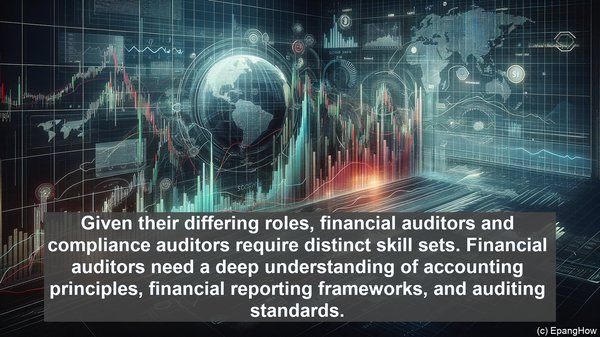Introduction: The World of Auditing
Hello everyone, and welcome to today’s video. When it comes to ensuring transparency, accuracy, and adherence to regulations, auditors play a crucial role. They are the gatekeepers who assess and validate financial records, internal controls, and compliance frameworks. In this vast field, two roles stand out – financial auditors and compliance auditors. While their objectives align in many ways, their approaches and areas of expertise differ significantly.
Financial Auditors: The Guardians of Financial Integrity
Financial auditors primarily focus on an organization’s financial statements. Their core responsibility is to examine these statements, ensuring they accurately represent the financial health and performance of the entity. They meticulously review transactions, account balances, and supporting documentation. By doing so, they not only verify the accuracy of the numbers but also assess the organization’s adherence to accounting standards and applicable laws. This is crucial for maintaining the integrity of financial information, which is vital for decision-making by stakeholders, such as investors, lenders, and regulators.

Compliance Auditors: Navigating the Regulatory Landscape
Compliance auditors, on the other hand, have a broader scope. While they do assess financial aspects, their primary focus is on ensuring the organization’s adherence to regulations, both internal and external. These regulations can vary depending on the industry, location, and the nature of the organization’s operations. Compliance auditors meticulously review policies, procedures, and practices, assessing their alignment with applicable laws and regulations. They also evaluate the effectiveness of the organization’s internal controls, which are designed to mitigate compliance risks. By doing so, compliance auditors help organizations avoid penalties, reputational damage, and other adverse consequences that non-compliance can bring.
Skill Sets and Expertise
Given their differing roles, financial auditors and compliance auditors require distinct skill sets. Financial auditors need a deep understanding of accounting principles, financial reporting frameworks, and auditing standards. They must possess analytical skills, attention to detail, and the ability to interpret complex financial data. Compliance auditors, on the other hand, need a strong grasp of laws, regulations, and industry-specific compliance requirements. They must be adept at conducting research, interpreting legal language, and assessing the practical implications of regulatory requirements. Additionally, both roles require excellent communication skills, as auditors often need to convey their findings and recommendations to stakeholders effectively.

Reporting and Stakeholder Engagement
Another key difference lies in the reporting and stakeholder engagement aspects. Financial auditors typically issue an audit opinion, which provides an assessment of the fairness and accuracy of the financial statements. This opinion is crucial for stakeholders, as it enhances the credibility and reliability of the financial information. Compliance auditors, on the other hand, often provide detailed reports highlighting areas of non-compliance, potential risks, and recommendations for improvement. These reports serve as a roadmap for the organization to enhance its compliance framework and mitigate risks. Additionally, compliance auditors often engage with regulators, industry bodies, and internal stakeholders to ensure a comprehensive understanding of the compliance landscape.
Collaboration and Integration
While financial auditors and compliance auditors have distinct roles, collaboration and integration between the two are essential. Financial audits often involve assessing compliance aspects, such as the organization’s adherence to accounting standards. Similarly, compliance audits may require a review of financial records to assess the financial implications of non-compliance. By collaborating and sharing insights, financial and compliance auditors can provide a holistic assessment, addressing both financial and compliance risks. This integrated approach is becoming increasingly important, given the growing complexity of regulations and their impact on financial reporting.
